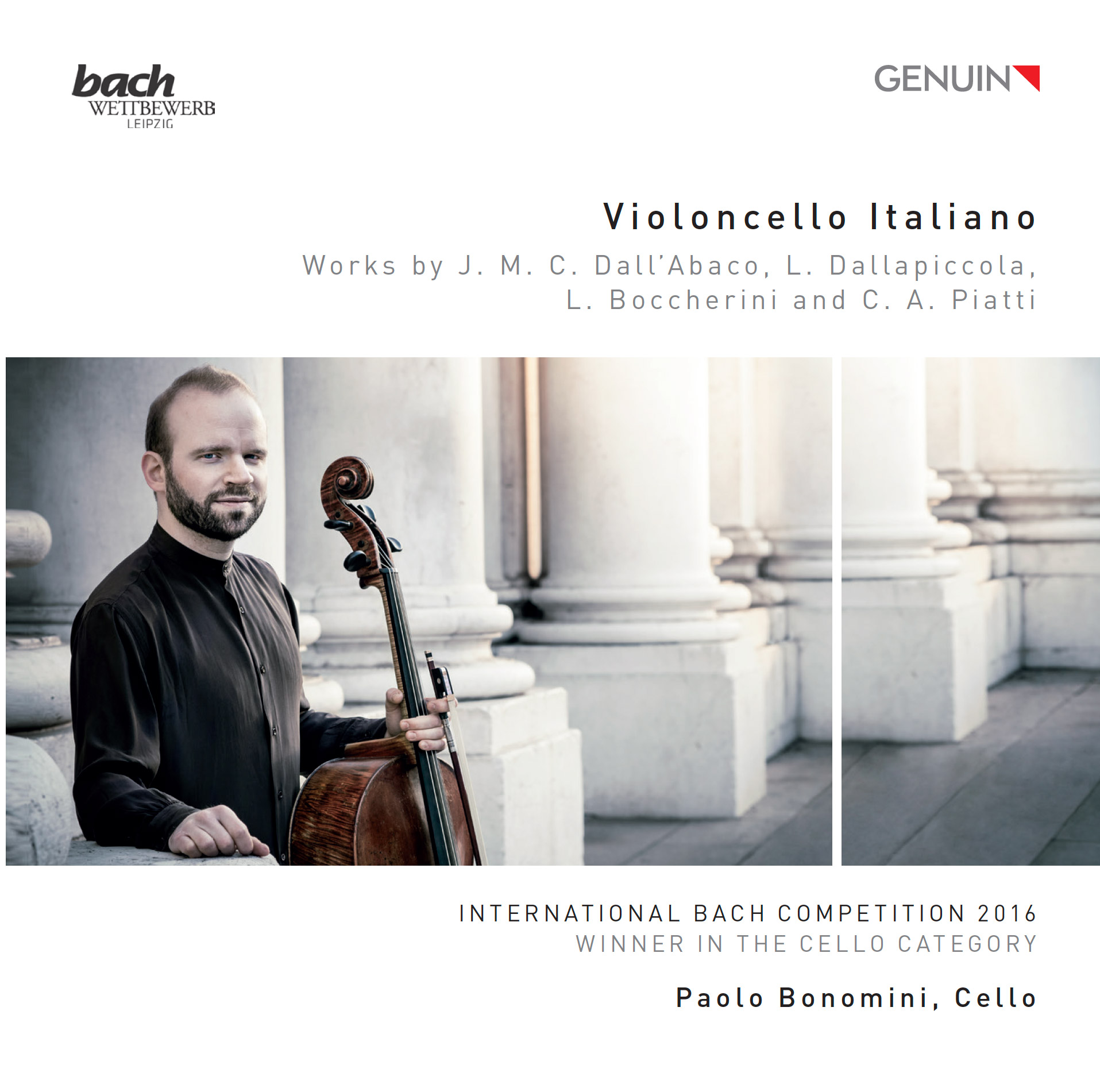Violoncello Italiano
Works by J. M. C. Dall’Abaco, L. Dalla piccola,
L. Boccherini and C. A. Piatti

Review by Fono Forum
Wenn Paolo Bonomini spielt, ist es andersherum: Man vergisst, in welche Höhen ein Orchester vorstoßen kann, wenn er mit dem Cello kilometertief in die Musik bohrt.
Bonomini gewann im letzten Jahr den Leipziger Bach-Wettbewerb in der Kategorie Violoncello und Barockvioloncello. Er ist ein würdiger Sieger, wie er nun auf seiner ersten Solo-CD beweisen darf.
Es gibt hier so gut wie nichts auszusetzen, dafür umso mehr zu loben. Zum Beispiel seine Fähigkeit zu phrasieren: Er spielt Spannungskurven, Spannungsparabeln und kunstvoll geschwungene Spannungsklammern. Er schiebt Melodieteile übereinander, lässt sie ineinander verlaufen, aufeinanderprallen, verlötet, verfugt und vernäht sie miteinander. Kein Übergang klingt gleich. Bonomini beeindruckt mit seiner Kreativität, und er hat die technischen Fähigkeiten, seine Ideen präzise umzusetzen. In Luigi Boccherinis Sonate begleitet ihn kongenial die Cellistin Magdalena Bojanowicz. Sie vollendet jede von Bonominis Ideen mit maßgeschneiderter Continuo-Begleitung.
Bonomini zeigt sich mit erst 27 Jahren bemerkenswert vielseitig. Er trifft für jede Epoche den richtigen Sound: von Joseph Dall’Abacos barocken Capricen bis zu Luigi Dallapicolas Chaconne, Intermezzo und Adagio, die er mit der ganzen Kompromisslosigkeit moderner Musik traktiert. In Alfredo Piattis Miniaturen versprüht er Wärme und Gelassenheit. Naoko Sonoda am Klavier tupft mit Bedacht ihre Begleitung darunter.
Im Beiheft zur CD schreibt Bonomini, dass er diese Stücke ausgewählt habe, weil er sich mit ihnen wohlfühlt. Man hört das bei jeder Note, die er spielt. Boccherini und Piatti waren die wohl größten italienischen Cello-Virtuosen. Ob Bonomini einst mit ihnen in einer Reihe stehen wird? Das Talent dazu hat er.
Ole Pflüger Fono Forum
Quando una grande orchestra sinfonica di cento o più strumenti spalanca le porte del paradiso è facile dimenticare che ogni strumento contiene già un intero universo.
Quando Paolo Bonomini suona, accade il contrario: ci si dimentica a quali altezza un’orchestra può spingersi quando lui con il suo violoncello penetra nelle più remote profondità della musica.
Lo scorso anno Paolo Bonomini ha vinto il concorso Bach di Lipsia per violoncello e violoncello barocco. È un degno vincitore, come dimostra il suo primo cd da singolo.
Nulla da eccepire anzi solo da elogiare, ad esempio la sua abilità nel fraseggio, nel modulare dinamiche e tensioni timbriche. Sovrappone le parti melodiche, le fa compenetrare, scontrare, per poi saldarle e ricucirle insieme. Ogni passaggio è diverso dall’altro.
Bonomini impressiona con la sua creatività e le abilità tecniche di cui dispone per tradurre in modo puntuale le sue idee.
Nella Sonata di Luigi Boccherini lo accompagna la violoncellista Magdalena Bojanowicz, che esegue ogni idea di Bonomini con un accompagnamento semprte tagliato su misura.
Bonomini è straordinariamente versatile a soli 27 anni. Trova per ogni epoca il giusto suono: dai Capricci barocchi di Joseph Dall’Abaco alla Ciaccona, l’Intermezzo e l’Adagio di Dallapiccola, che esegue con l’intransigenza senza compromessi della musica moderna. Nelle miniature di Alfredo Piatti emana calore e pacatezza.
Naoko Soda al piano lo accompagna con accortezza.
Nel libretto allegato al cd Paolo Bonomini scrive che ha scelto questi pezzi perché si trova bene con loro. Lo si sente ad ogni nota che esegue.
Boccherini e Piatti erano probabilmente i più grandi virtuosi del violoncello italiano. Siederà Bonomini un giorno insieme a loro? Di talento ne ha.
Ole Pflüger, Fono Forum 2018
Review by Michele Ballarini “Archi”
La scelta operata per questo CD da Paolo Bonomini, giovane violoncellista bresciano da poco vincitore del prestigioso Bach Wettbewerg di Lipsia, è un’antologia di autori nostrani attraverso una prospettiva storica che, partendo dal tardo barocco di Joseph Marie Clément Dall’Abaco, si inoltra nelle volute virtuosistiche di Boccherini e di Piatti per arrivare al ‘900 puro di Dallapiccola; l’ordine dei brani è variato – l’ultimo si trova in seconda posizione – ma ciò costituisce un magnifico contrasto che permette a Bonomini di dimostrare di essere già un musicista che si esprime attraverso il proprio strumento e non – come spesso accade – il contrario.
È in effetti stupefacente come ogni autore sia profondamente scavato nelle sue più intrinseche caratteristiche le quali si rilevano attraverso una solidissima base tecnica, una condizione questa che si dimostra anche ideale per rendere in pieno tutte le intenzioni dell’interprete, arrivando ad annullarsi completamente nel significato puramente musicale del brano eseguito.
Se infatti l’ascolto dei Capricci di Dall’Abaco, le cui strutture forse leggermente ripetitive vengono qui affrontate con una maestosità quasi bachiana che riesce a salvarle in pieno da una latente monotonia, può costituire una gradevolissima base di partenza, ben diversamente accade nella lettura della Ciaccona, Intermezzo e Adagio di Dallapiccola, nella quale il Nostro arriva a rendere del tutto giustizia a questo brano magistrale: un assunto di grana corrusca e talvolta aspra dove impennate sonore di grande drammaticità e di scolpita pulsazione ritmica sprofondano in zone di più rarefatta allucinazione, facendo intravvedere velature sottilissime di argentea filigrana dietro le quali si celano spazi spettrali che si perdono il lontane oscurità. Ma è proprio a causa della natura così evanescente dell’Adagio conclusivo che lo stacco di Boccherini ci proietta con uno sbalzo emozionante nella dorata simmetria della Sonata in Do Maggiore, ambito geometricamente equilibrato che funge da sfondo per agili architetture strumentali condotte con perfetta tenuta anche a velocità mozzafiato.
Chiudono il CD quattro brani di Alfredo Piatti, lavori la cui destinazione salottiera viene resa attraverso una signorilità di eloquio la quale, oltre a fungere sempre da contrappeso ideale a brillanti giochi virtuosistici, riscatta totalmente la tinta superficialmente leggera di queste gradevoli composizioni, arrivando a costituire una sorta di prelibato dessert a questo bellissimo e avvincente programma.
Michele Ballarini “Archi”
Beethoven String Trios
Op. 3 and Op. 8

Pre release concert in Teatro La Fenice, Venice, September 24 and 25, 2021
Out for streaming and purchase October 1, 2021
Official release concert in Piano Salon Christophori, Berlin, 28 October, 2021
Beethoven String Trios
Op. 9 Nos. 1–3

Das Orchester
“Thus one enjoys sovereignly balanced sounds in the slow movements as well as wild contrapuntal virtuoso roaring in the scherzos or the final movements. The Trio Boccherini obviously has the necessary curiosity to question the relevance of the classical repertoire, to brush it against the grain, so to speak.”
WDR3 Tonart
The Boccherini Trio implements this ever-repeating, questioning, talking, hanging on to thoughts in an absolutely credible manner. This is one of the ensemble’s strengths, which is evident throughout the recording.
Deutschlandfunk Kultur
“Heart and mind. With Trio Boccherini, the two combine organically and logically.”
Review by Das Orchester
Before Beethoven made himself immortal in the sacred discipline of string quartet, he explored the possibilities of the string trio briefly but in detail. After the early op. 3 and 8, which are still strongly linked to Mozart and Haydn, the three trios op.9 – which the man who had just left the province of Bonn put on paper as a kind of visiting card for his new home Vienna from 1796 to 1798 – are at the same time the high point as well as the end of this genre in his oeuvre, and which set standards up to the present day. Innovative, very tricky, demanding, this is for connoisseurs, which requires professionals rather than good amateurs on the instruments.
It is certainly due to this jubilee year, which is so alarmingly lacking in music, that the Trio Boccherini recorded Beethoven’s op. 9 for the CD, produced by the excellent Leipzig label Genuin. The three musicians – Suyeon Kang (violin)
, Vicki Powell (viola) and Paolo Bonomini (cello) – met in Berlin in 2014 and have since matured into one of the most interesting chamber music ensembles in the classical circuit.
Three musicians, three cultural backgrounds, one goal: unity. The Trio Boccherini is constantly working on this goal receiving impulses from members of renowned chamber musicians such as Rainer Schmidt (Hagen Quartet) or Hatto Beyerle and Günter Pichler (Alban Berg Quartet). And right from the first sounds of the G-major trio, the musiciansʼ unconditional will catches your ears, both to show their own individuality and at the same time their ability
to listen to one another and the voices of their old Italian instruments, dialoguing in the service of a higher whole.
You can enjoy perfectly balanced sounds in the slow movements as well as wild contrapuntal virtuoso playing in the Scherzi or the final movements. The trio obviously has the necessary curiosity to question the
relevance of the classical repertoire, to go against the grain, so to speak. This becomes
ear-catching, for example in the rather daring tempos of the fast movements and in the
desire to savor Beethovenʼs formal and harmonic escapades. And in the slow movements,
the great care in their phrasing and sound.
A sense of harmonious well-being is established in the ear. It is a pleasure to encounter Beethoven’s work once again on a side path, with all the associations that Opus 9 triggers with regard to the String Quartets Op. 18, composed just a year later. That the lack of a second violin – to the four-part ideal! – is hardly noticeable, is the merit of the three musicians from Berlin, who are unmistakably led and at the same time inspired by the famous violinist. It time to see the three of them live again.
Bevor Beethoven sich in der kammermusikalischen Königsdisziplin Streichquartett unsterblich machte, lotete er kurz, aber ausführlich die Möglichkeiten des Streichtrios aus. Nach den frühen Opera 3 und 8, die noch stark an Mozart und Haydn anknüpfen, bilden die drei Trios op. 9, die der gerade aus der Bonner Provinz Abgereiste als eine Art Visitenkarte für seine neue Heimat Wien von 1796 bis 1798 zu Papier brachte, zugleich Höhe- wie Endpunkt dieser Gattung in seinem OEuvre und setzen Maßstäbe bis in die Gegenwart. Innovative, ganz schön vertrackte, in jeder Beziehung anspruchsvolle Musik für Kenner, die an den Instrumenten Profis viel eher als gute Laien voraussetzt.
Nun ist es sicher diesem so erschreckend musikarmen Jubiläumsjahr zuzuschreiben, dass das Trio Boccherini Beethovens op. 9 für die CD aufnimmt, produziert vom exzellenten Leipziger Label Genuin. Die drei Musiker – Suyeon Kang (Violine), Vicki Powell (Viola) und Paolo Bonomini (Cello) – haben 2014 in Berlin zusammengefunden und sind seitdem zu einer der interessantesten Kammermusikbestzungen im Klassikzirkus gereift.
Drei Musiker, drei kulturelle Hintergründe, ein Ziel: Einheit. Daran arbeitet das Trio Boccherini stetig und mit kontinuierlichen Impulsen von Mitgliedern renommierter Kammermusiker wie Rainer Schmidt (Hagen-Quartett) oder Hatto Beyerle und Günter Pichler (Alban Berg Quartett). Und gleich bei den ersten Klängen des G‑Dur-Trios, der Nummer 1, fällt dieser unbedingte Wille der Musiker ins Ohr, sowohl die je eigene Individualität in die Waagschale zu werfen wie zugleich das Vermögen, einander zuzuhören und die Stimmen der alten italienischen Instrumente einander anzupassen im Dienste eines höheren Ganzen.
So genießt man souverän austarierte Klänge in den langsamen Sätzen ebenso wie wildes kontrapunktisches virtuoses Getös’ in den Scherzi oder den Finalsätzen. Das Trio Boccherini bringt ganz offensichtlich die nötige Neugierde mit, das klassische Repertoire auf seine Relevanz zu befragen, quasi gegen den Strich zu bürsten. Das wird ohrenfällig etwa in ziemlich gewagten Tempi der schnellen Sätze, an der Lust, Beethovens formale und harmonische Eskapaden auszukosten. Und an der großen Sorgfalt, mit der die langsamen Sätze phrasiert und klanglich gestaltet sind.
Im Ohr stellt sich demnach Wohlbefinden ein. Es macht Vergnügen, Beethovens Werk wieder einmal auf einem Seitenweg zu begegnen, mit all den Assoziationen, die das Opus 9 etwa im Hinblick auf die nur ein Jahr später entstandenen Streichquartette op. 18 auslöst. Dass dabei das Fehlen einer Zweiten Geige – zum vierstimmigen Ideal! – kaum auffällt, ist das Verdienst der drei Musiker aus Berlin, die von der famosen Geigerin unmissverständlich angeführt und zugleich inspiriert werden. Es wird Zeit, die drei einmal wieder live erleben zu können.
Armin Kaumanns
